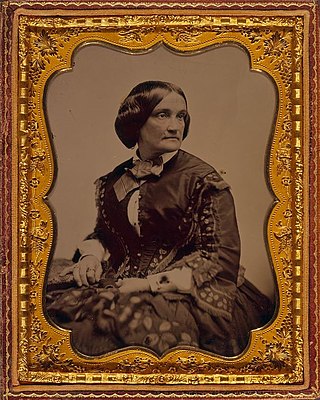
Charlotte Saunders Cushman was an American stage actress. Her voice was noted for its full contralto register, and she was able to play both male and female parts. She lived intermittently in Rome, in an expatriate colony of prominent artists and sculptors, some of whom became part of her tempestuous private life.

Evelyn Selbie was an American stage actress and performer in both silent and sound films.

The Randolph family of Virginia is a prominent political family, whose members contributed to the politics of Colonial Virginia and Virginia after statehood. They are descended from the Randolphs of Morton Morrell, Warwickshire, England. The first Randolph in America was Edward Fitz Randolph, who settled in Massachusetts in 1630. His nephew, William Randolph, later came to Virginia as an orphan in 1669. He made his home at Turkey Island along the James River. Because of their numerous progeny, William Randolph and his wife, Mary Isham Randolph, have been referred to as "the Adam and Eve of Virginia". The Randolph family was the wealthiest and most powerful family in 18th-century Virginia.

Mary Anderson was an American theatre actress.

Samuel David Gross was an American academic trauma surgeon. Surgeon biographer Isaac Minis Hays called Gross "The Nestor of American Surgery." He is immortalized in Thomas Eakins' The Gross Clinic (1875), a prominent American painting of the nineteenth century. A bronze statue of him was cast by Alexander Stirling Calder and erected on the National Mall, but moved in 1970 to Thomas Jefferson University in Philadelphia.
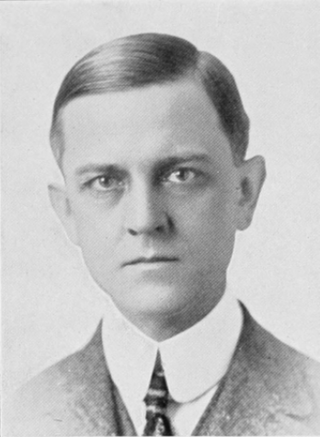
Robert Worth Bingham was a politician, judge, newspaper publisher and the United States Ambassador to the United Kingdom from 1933 to 1937.

Mary Ann Davenport [née Harvey] was a British Shakespearean actress.

Julia Dean was a stage and film actress who began her career in the 1890s.
NAACP in Kentucky is very active with branches all over the state, largest being in Louisville and Lexington. The Kentucky State Conference of NAACP continues today to fight against injustices and for the equality of all people.
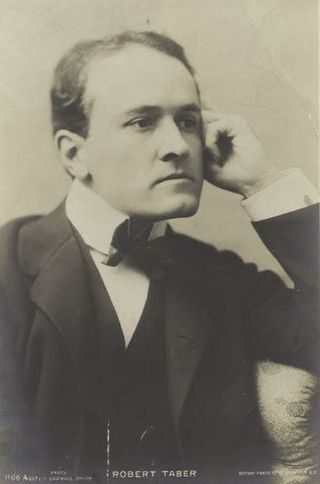
Robert Schell Taber was an American Broadway actor of the late nineteenth and early twentieth centuries.

Janet Beecher was an American stage and screen actress.

Julia Dean was an American actress who made her New York debut at 16 in a starring role with the James Sheridan Knowles comedy, The Hunchback. Her performance was met with such praise that she continued to star in productions of The Hunchback over much of her twenty-year career. Although she began and ended her career on the East coast, Dean's greatest popularity was achieved in tours of the American South and the Far West. Dean was married twice; she was the mother of four children, but died in childbirth with a stillborn son at the age of 37.
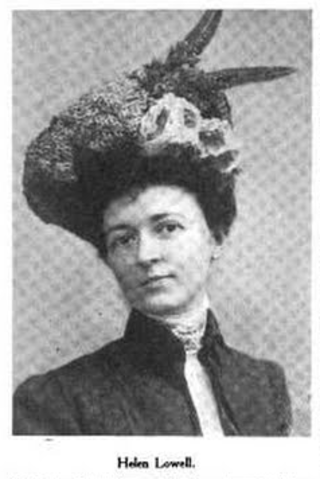
Helen Lowell, born Helen Lowell Robb (1866–1937), was an American stage and film actress.

Julia A. Tevis was a pioneer educator of women from Kentucky. After teaching for several years in Virginia, she founded the Science Hill Female Academy in Shelbyville and led the institution to gain a national reputation for excellence. Teaching her students math and science, rather than how to be accomplished seamstresses, Tevis prepared young women for colleges.
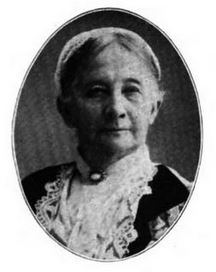
Susan Look Avery was an American writer, suffragist, pacifist and supporter of temperance as well as a single tax. She hosted Lucy Stone and husband Henry Blackwell when they came to Louisville, Kentucky for the American Woman Suffrage Association meeting—the first suffrage convention in the South—in 1881. In 1890 she started the Woman's Club of Louisville, and in honor of her birthday, the suffrage club of Wyoming, New York, named itself after her.

Charlotte Wattell was an English actress of the late 18th and early 19th-centuries and the first wife of the churchman Thomas James Twisleton.

Elise Clay Bennett Smith was President of the Kentucky Equal Rights Association from 1915 to 1916, and served as an Executive Committee member for the National American Woman Suffrage Association. Her last name changed several times as she married three men in succession: from her birth surname of Bennett she became Smith, then Jefferson, and finally Gagliardini.
Sudie Bond was an American actress on film, stage, and television.

Julia Blackburn Duke Henning was an American suffragist and clubwoman, based in Louisville, Kentucky.

Margaret Anderson Watts was an American social reformer in the temperance movement, writer, and clubwoman. She was a deep thinker on the most advanced social and religious topics of her day, and occasionally published her views on woman in her political and civil relations. She was the first Kentucky woman who wrote and advocated the equal rights of woman before the law, and who argued for the higher education of woman. She served as president of the Woman's Christian Temperance Union (WCTU) of Kentucky, and as the National WCTU's Superintendent of police matrons.


















